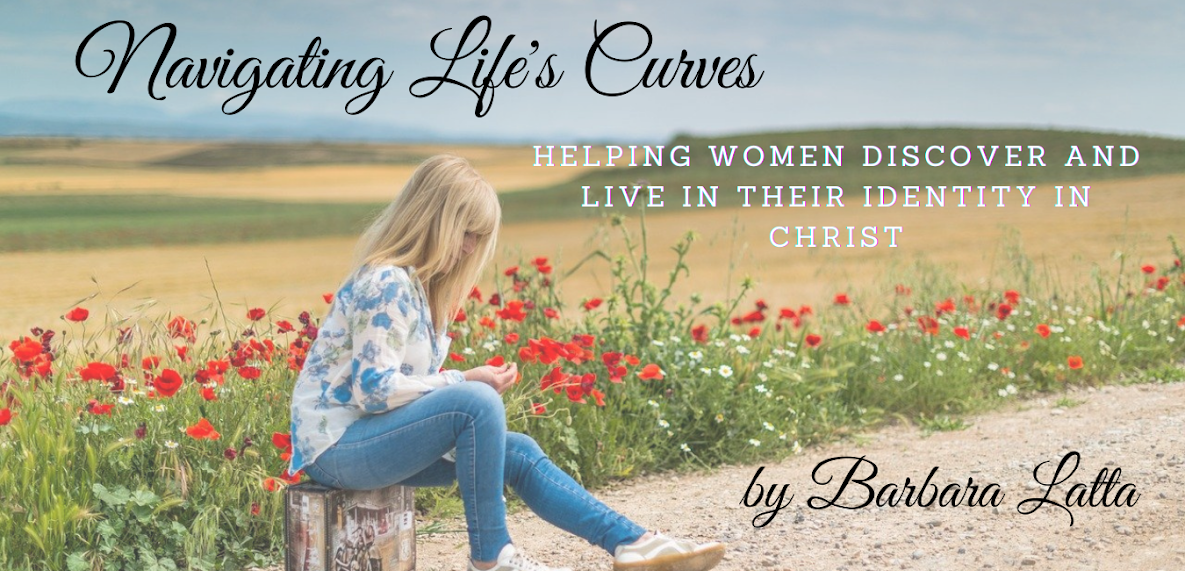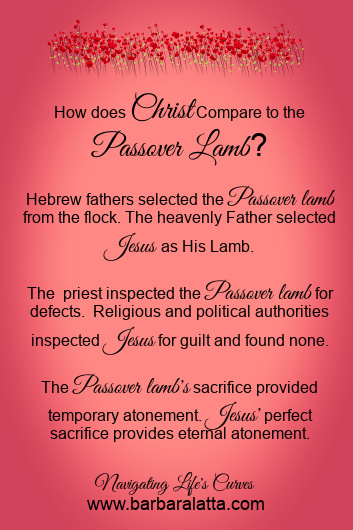by Barbara Latta @barbaralatta
The great God Jehovah performed miracles like no one had
ever seen before to free His people from bondage in Egypt. Before the tenth
plague swept through the land, God gave Moses the instructions for the Passover
meal which was to be eaten the day before they were delivered from Egypt (Exodus
12). The Lord later gave Moses directions for feasts and festivals that would
all point to the future Redeemer of mankind.
We may ignore these Old Testament rituals and think they
have no purpose for us as Christians today. But we can see connections and
similarities in God’s commandments to the Hebrews.
How does Passover and the Feast of Unleavened Bread connect to our atonement as New Testament believers?
The Passover lamb was selected by the father. Each family was to choose a lamb that was perfect in every way. No blemishes. Jesus was selected by God, His Father, to be the sacrifice but He was placed into the hands of His executioners through Judas who betrayed Him.
The Passover lamb was
kept separate from the rest of the flock. Roman soldiers separated Jesus from
His flock and took him prisoner.
The Passover lamb was inspected. The Passover lamb was inspected by the priest to determine if there was any type of defect in the animal. Jesus was brought before the Sanhedrin, questioned extensively, yet no one could agree on any of the charges against Him because they were all false.
He was brought before Pilate and this Roman governor said he found no fault in the
Man who stood before him. Those in religious and political authority inspected
Him but found nothing wrong in the Son of God.
The Passover lamb was sacrificed. Jesus was without guilt
yet He was crucified anyway. Israelites placed the lamb’s blood on their
doorposts to stop the death angel from killing the firstborn. Jesus our Lamb
was sacrificed on Calvary and His blood was put on the Mercy Seat of heaven to
atone for all our sin (Hebrews 9:12). No more death angel because death and the
grave were defeated.
The Feast of Unleavened Bread began the day after the Passover meal. This commemorated the hasty exit of the Israelites from Egypt. They left before their bread could rise. This unleavened bread is what Jesus tore apart and gave to His disciples as they ate their Passover meal (Luke 22:13–20).
Even though Jesus told them this would be the last time they would do this together, they didn’t comprehend what He meant.
In Scripture, leaven sometimes represents sin. This seven day observance requires Jews to remove every speck of dust, dirt, and leaven from their homes.
No matter how hard anyone attempts to remove every piece of leaven from their homes, there will be a missed Froot Loop under a cushion, a bread crumb on the floor, or dust that blows in through an open door.
If we can’t
remove each morsel of physical dirt from our lives, we certainly can’t absolve
ourselves from spiritual dirt.
How appropriate that the Feast of Unleavened Bread follows
the Passover meal. We no longer need to strive to remove sin through our
actions—which we can’t do anyway. Christ washes away every speck of sinful dirt
from our spirit when we accept His sacrifice on the cross.
Therefore, if anyone is in
Christ, he is a new creation; old things have passed away; behold, all things
have become new. Now all things are of God, who has reconciled us to Himself
through Jesus Christ, and has given us the ministry of reconciliation. (2
Corinthians 5:17–18)
We are made new in our nature but we do still have a flesh
to deal with. Christ’s atonement also covers our mental and emotional lives. His
word, through the Apostle Paul, shows us how to receive the strength to
overcome our flesh by renewing our minds (Romans 12:1-2)
The Passover lamb was eaten, none remained until morning,
and none of the animal’s bones were broken. Jesus’ body didn’t remain on the
cross overnight and the soldiers didn’t beak a single bone of the Savior’s
body. We partake of Christ’s flesh by accepting His payment for our sins.
Most assuredly, I say to you,
unless you eat the flesh of the Son of Man and drink His blood, you have no
life in you. Whoever eats My flesh and drinks My blood has eternal life, and I
will raise him up at the last day. (John 6:53–54)
Victory Day
On the third day Jesus Christ, the perfect Son of God,
walked out of the grave. He clutched the keys of death and hell and will never
suffer again because His work is complete (Hebrews 10:12). The death
angel didn’t just pass over, he is defeated. Satan’s power over believers is no
longer valid. (click to tweet)
Having disarmed
principalities and powers, He made a public spectacle of them, triumphing over
them in it. (Colossians 2:15)
Resurrection Day is our day to celebrate because we are free
from the shackles of a sinful nature. As believers, we have a new identity, a
new life, and a new future because Christ is risen!
What does this victory mean to you? Join the conversation
and share your thoughts.



Such an encouraging and inspiring post this morning Ms. Barbara. Thank you for helping start my morning with praise! God's blessings ma'am and Happy Easter. He is risen!
ReplyDeletePraise be to the Lord for He is risen. Thanks for sharing, J D. Blessings and Happy Easter!
DeleteA timely message, Barbara. Thank you for sharing these connections between the religious practices of the Jewish people and the trial, death, and resurrection of Jesus. The connection is appropriate since Jesus was a Jew. More importantly for us, He is the way, the truth, and the life and He loved us so much that He died for us. Greater love! Happy Easter!
ReplyDeleteWe sometimes overlook these Jewish feasts as not important to us today. But they were given to look forward to what our Redeemer would do for us. Thanks for sharing, Katherine. Blessings and Happy Easter!
DeleteSuch a meaningful post. I find this very encouraging: "If we can’t remove each morsel of physical dirt from our lives, we certainly can’t absolve ourselves from spiritual dirt." It helps lift the burden I feel when I don't live up to what I think God's standards are. Your post reminds me it's okay to fail. We can't remove sin from our lives on our own anyway.
ReplyDeleteCandyce, I am so thankful Jesus removed all our dirt because yiu are right, we sure can't remove it ourselves. Thanks for sharing. Blessings!
DeleteI love connecting the Old Testament with the New, and the Passover connection never fails to amaze and touch my heart. Thank you for once again bringing it to our attention.
ReplyDeleteSeeing this connection does give these feasts a richer meaning. Thanks for sharing, Sylvia. Blessings!
DeleteI love the parallels you drew, Barbara. Resurrection Day is a reminder to reset our thinking and remember we are freed daily to walk in the victory of Christ. Hallelujah!
ReplyDeleteThe anonymous comment is mine. We’ll fine, Barbara.
DeleteThanks for sharing your thoughts. Blessings!
DeleteThanks for sharing Barbara. It is important to understand the connection. Great post
ReplyDeleteThanks for sharing, Yvonne. Blessings!
DeleteI wanted to cheer as you described Christ's victory, Barbara. The symbolism in these festivals is so rich. Thank you!
ReplyDeleteThanks for sharing, Annie. I do the symbolism in the Old Testament feasts and festivals. Blessings!
DeleteI love these connections Barbara. Not only are they meaningful in connecting Jesus the Lamb of God to the feast of Passover, it shows how God had it all set up, all planned from the beginning. For me this ties the Bible together as Truth, capital T.
ReplyDeleteTruth with a capital T. I like that, Cathy. And I, too, think these feasts tie the Bible together. Thanks for sharing. Blessings!
Delete